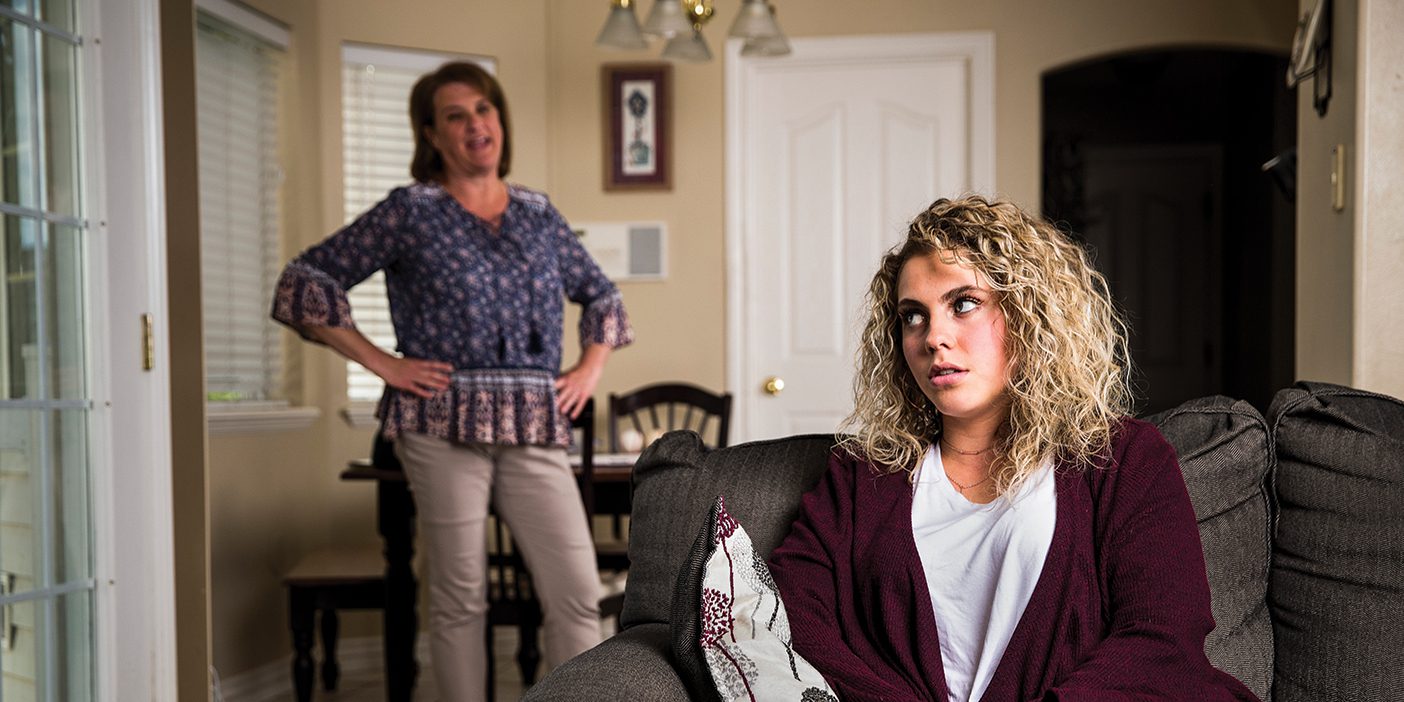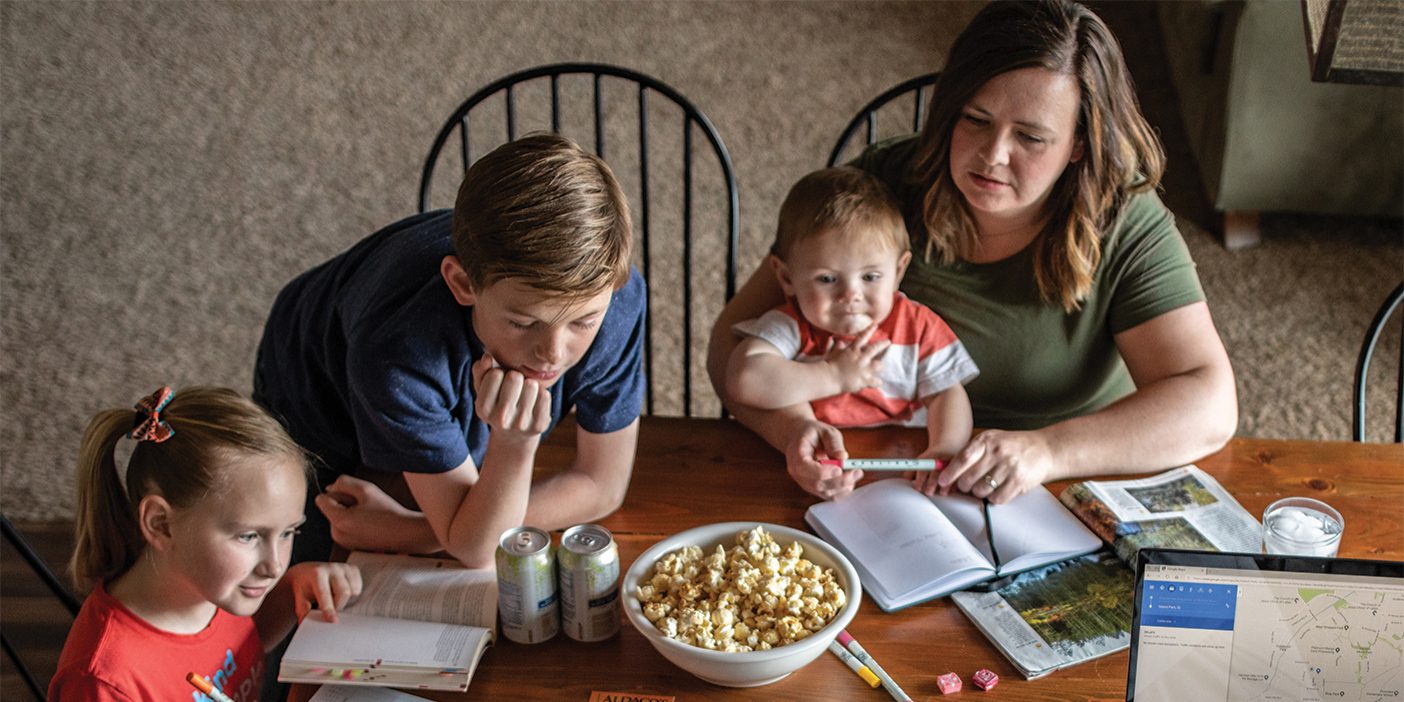Parents can help teens navigate their first romantic relationships.

About a year ago, Gretchen Winert Skelly (BS ’94, MSW ’96) and Scott Skelly’s 16-year-old son had been steadily dating a girl for many months when she broke up with him. The girl’s parents were uncomfortable with the seriousness of the relationship and insisted it end. “My son was tearful and heartbroken for weeks,” says Gretchen.
It can be tough for parents to know exactly what lines to draw when teens date and where to draw them—and how to comfort their teen when romance doesn’t go well. The pain of a breakup can be distressing for everyone—especially for inexperienced teens. But the Skellys also saw the good side of their son gaining dating experience. “He is shy, and his girlfriend was outgoing, which helped him to get more comfortable with people,” says Gretchen.
Research shows that a majority of teens experience a romantic relationship by age 18, says Adam A. Rogers (BS ’12), assistant professor of family life. His recent study in the Journal of Youth and Adolescence found that teens in a relationship can experience significant daily ups and downs.
“This happens in every relationship, but adolescents may have limited cognitive or emotional resources to handle it,” says Rogers. “Conflict can really promote negative moods in an adolescent and cause intense daily fluctuations that are contagious to the other person in a relationship.”
Rogers believes parents should learn the basics of adolescent brain development, understand the risks and benefits of teen romance, and know how to support their teens through relationship turbulence.
Young Love and the Adolescent Brain
Fundamental thinking and behavior develop in the brain first, while higher functions like decision making and regulation of emotions finish developing later. Rogers says most people don’t have a fully developed brain until about age 24, says Rogers.
During adolescence reward centers of the brain become much more active, resulting in more intense emotions that tweens and teens can find challenging to modulate. Researchers frequently find depression during this phase, with kids ages 12–14 most at risk, says Rogers.
Rapidly changing brain chemistry can make emotions around any conflict tough to handle but especially romantic conflict. “We found in our study that when kids in a romantic relationship disagree, their mood goes down. . . . In turn, when one partner dips into a negative mood, that mood transfers to the other person,” says Rogers, who notes that he and his colleagues found no gender differences for this dynamic.
Individuation, the process of becoming an independent self separate from one’s parents, is a critical stage in human development. With the brain changes that occur during adolescence, individuation kicks into high gear.
Parents should not take personally a teenager’s need for nonconformance and increased privacy, as these are often normal and healthy strategies for individuation, says Rogers. “Teens put up stronger and stronger boundaries as they get older, picking and choosing carefully what they will and won’t talk about. Secrecy goes up, and disclosure goes down. Teens tend to believe that a romantic relationship is one of the things parents have the least right to know about,” he says.
A Risk with Benefits
Another of the Skellys’ sons, now 20, had a high school girlfriend who struggled with depression, which weighed heavily on him. It impacted his family, says his mom, because he wanted to be there for her and would often bail on family time. “Also he lost sleep due to worrying about her,” says Gretchen.
Teen years are full of turmoil, so parents might wonder why they should allow romantic relationships into the mix. Rogers says it isn’t really a matter of allowing or not allowing. Teenagers experience romantic attractions, and many will act on them whether parents know about it or not, especially at school, where parents aren’t around.
“The focus should be on a good relationship with the child so that you’re the one they go to when they need help.”
adam rogers
“Romantic experiences at this age, when they happen, are very important to the kids involved,” says Rogers. “They also set the foundation for how adolescents will approach their future relationships, so as parents we want to be supportive. If things go badly and a teen has no support, that experience can set the child up for relationship challenges in the future. Depression can develop. It’s not that teens shouldn’t date. Just be aware and be supportive.”
Romantic relationships can give teens important positive experiences, as the Skellys found with their middle son. He learned to connect better to peers because of his extroverted girlfriend, and he learned better study habits because she encouraged him.
Supportive Parenting
Many parents might be tempted to forbid young teens from becoming involved in a romantic relationship. Forbidding teens from doing anything, as opposed to teaching them and encouraging certain behavior, can trigger rebellion that otherwise might not occur, says Rogers. Most teens enjoy flouting rules to some degree as they figure out how to become autonomous. Parents who condemn teen romance will find their child hesitant to talk to them or unwilling to talk altogether.
“The more lecture-y parents are about it, the worse off adolescents are. Teens already know what parents think and don’t need to be told repeatedly. The focus should be on a good relationship with the child so that you’re the one they go to when they need help,” he says.
Conflict in teenage romances tends to center on mundane issues, says Rogers, such as not liking each other’s attitude on a particular day and not caring for each other’s friends.
Gretchen Skelly says her work as a therapist specializing in adolescents has helped her establish a relationship with her boys by carefully listening to and validating their feelings. “While I don’t fool myself that they tell me everything, I believe my sons feel comfortable sharing emotional aspects of their lives,” she says.
Preparing to Leave the Nest
As adolescents progress toward a stronger sense of autonomy, parenting also needs to change to help facilitate this healthy process. This is not always easy and can produce tensions between adolescents and parents about things like rules, parental supervision, and privacy, says Rogers. It might feel to parents like they’re losing their relationship with their kids, but he cautions parents to perceive this phase not as a loss but as normal growth toward maturity.
“Parents tend to rate their relationship with their teenager as declining somewhat, but interestingly, the vast majority of teens continue to love and admire their parents despite the conflicts. About when adolescents leave home, generally families feel almost complete repair from many lingering challenges they have,” he says.
That’s not to say that disruption of the relationship is inevitable. So far, the Skellys have maintained strong communication with all three of their sons, ages 20, 17, and 13. “Their father and I have a policy to be nonreactive and nonjudgmental to anything that is shared in the moment. We can freak out after the fact if necessary,” says Gretchen. “I also still visit my kids’ rooms almost nightly to give them one-on-one time to talk with me. Having a safe place to talk has helped our boys to be open with us.”
The Skellys’ efforts to create a home that provides a soft landing place for their children is making all the difference in maintaining their parental influence and keeping the family close, says Gretchen: “We know there are no guarantees for the future, but so far we feel close to our sons and are grateful they feel close to us.”
Supporting Dating Teens
Rogers offers additional dos and don’ts for parents as they support their teenagers in romantic relationships:
DO
• Be involved. If you’ve made efforts to stay connected, teens will feel more comfortable approaching you about relationship problems.
• Monitor your children’s comings and goings. They might protest your close supervision, but they will likely feel your love and concern.
• Keep in mind that dating, even steady dating, can offer your child growth opportunities.
• Realize that young love can be very real. Some teens do eventually marry their first love.
• Be alert for signs of obsession, such as talking on the phone or being online for long hours and neglecting other aspects of life. Set limits and closely monitor screen time, confiscating devices for a time if necessary.
DON’T
• Elicit information about your teens’ romantic interests against their will. They are likely to push back against your attempts, and research shows that this dynamic is associated with poor parent-child relationship outcomes.
• Allow your teen to stay in a dangerous relationship. Your child may feel resentful for a while, but in the long run it’s more important that he or she stay safe during a vulnerable period of life than to stay in your good graces.
Sue Bergin is a writer and Marriott School adjunct instructor.












